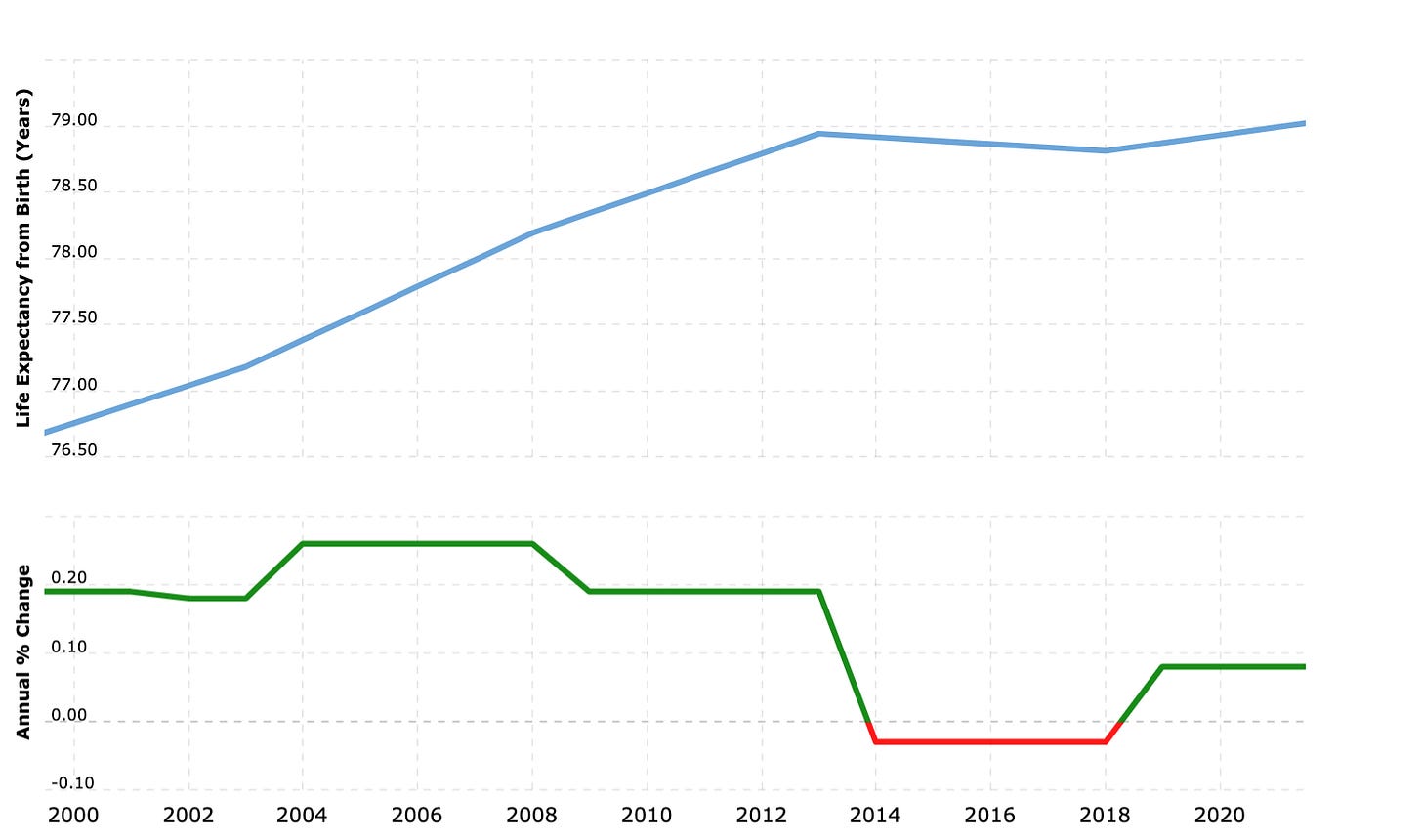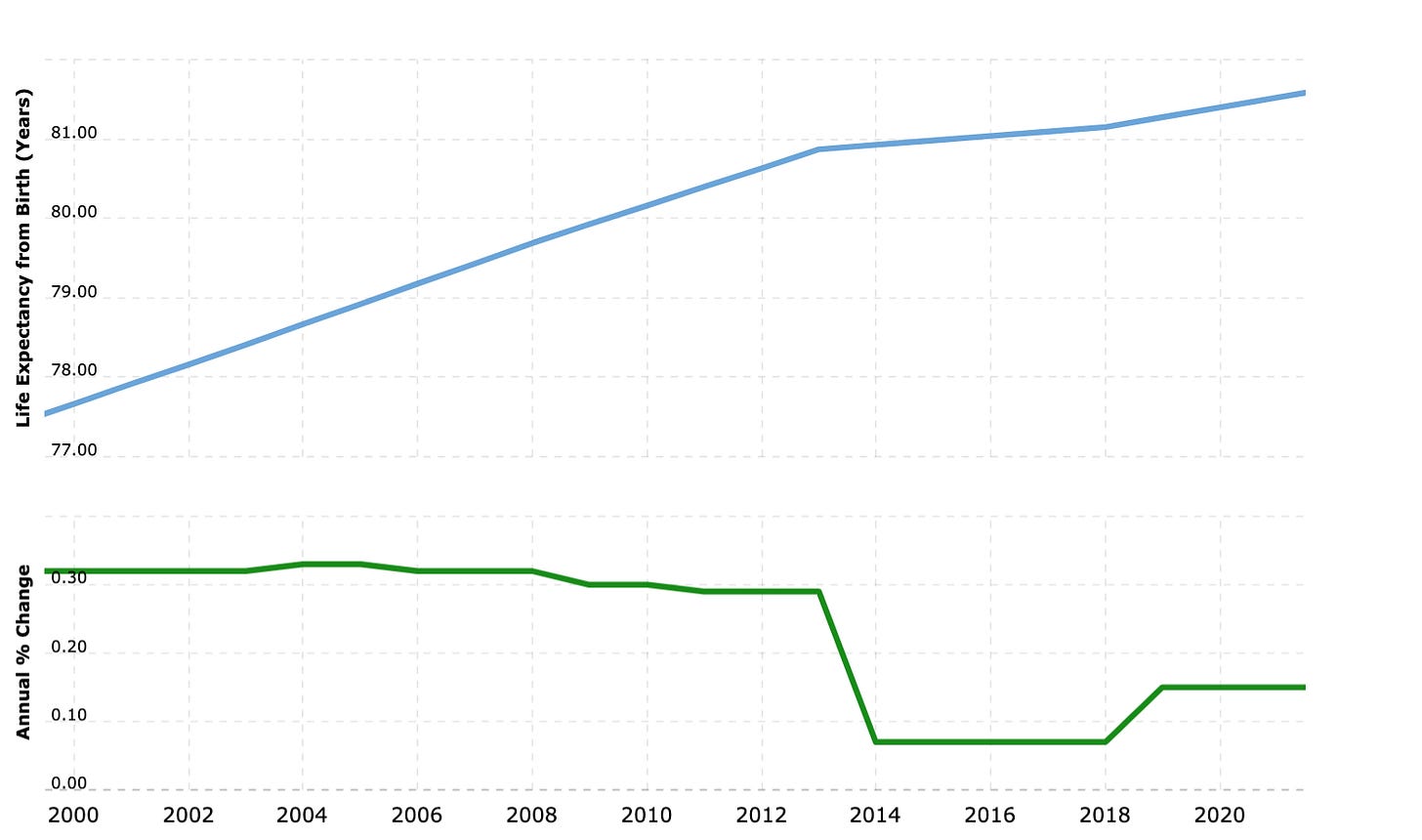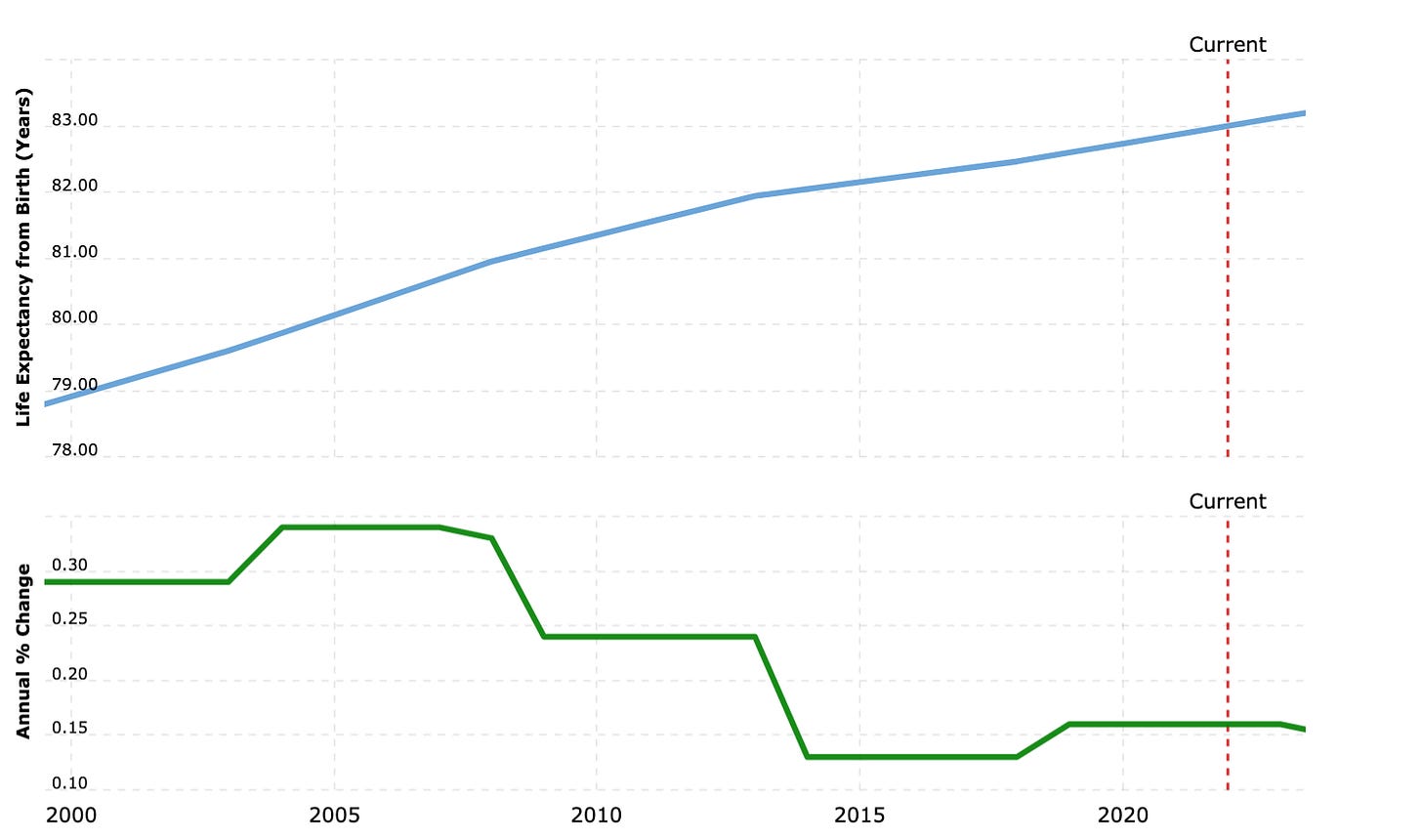Explaining America's Falling Life Expectancy
America is killing Americans
Welcome to JoeWrote! If you enjoy my work, please consider supporting me in one of two ways: Becoming a paid subscriber, or, if financial support isn’t an option for you, please share on social media to help JoeWrote grow.
Enjoy! - Joe

“Hearts starve as well as bodies; give us bread, but give us roses.” - Helen Todd
Of all the leftist writings I have consumed to feed my political nerdom, none have stood out to me as much as the above words of suffragette and labor activist Helen Todd. Mixing art with intent, Todd succinctly articulates how Capitalism comes with a dagger in each hand, one for the worker’s mind, the other for their soul. While these words were wielded against slave-like conditions in early 20th century factories, the progression of Capitalism has not eliminated this two-dagger attack.
Last week, the New York Times published an article detailing the “historic setback” COVID had on American life expectancy. The article argues America’s mask and vaccine reluctance is to blame, as evidenced by comparision to peer nations, who have since begun to recover while we have not. And while all demographics were impacted by COVID, Native and Indigenous communities were hit the hardest. Measuring by vaccination rates, we can tell these groups were quite COVID-cautious, indicating the root of their demise lay in the health consequences of poverty and discrimination.
While I was pleased to see the NYT emphatically stating class immiseration as the cause of this decline, I do have a grievance with their report. What the piece fails to contextualize is that American life expectancy has been in crisis before the pandemic. The below graph shows both American life expectancy (top line) and the change year over year (bottom line).

The U.S. is an industrially developed, wealthy country. To see its life expectancy stagnate in 2012 is cause for concern. But to see it fall, as it did from 2014 to 2018, is a five-alarm fire. And when taken in conjunction with the NYT’s data on the COVID years of 2020 to 2022, the understanding of American well-being is quite grim.
In summary, by the end of 2021, the median American could expect to live for 76.1 years. That’s .65 years less than an American could expect to live in 2000 (76.75).
By looking at the life expectancy of our peer nations, it becomes clear dying early is a uniquely American phenomenon, just like Apple Pie and high rates of gun ownership. (I wonder if that’s related?)
United Kingdom
Japan
France
China
As the data shows, none of these nations experienced the mid-2010s decline that plagued the U.S. In fact, the lowest rate of life expectancy growth any of these nations experienced (+ .8 years in the United Kingdom, from 2014 to 2018) equals the U.S.’s increase from 2018 to pre-COVID 2020. That means our “high” was these countries’ low.
Additionally, the decrease is not a natural correction. Before America’s period of declining life expectancy, our highest rate of growth (+ .27 years) is well below where these comparative countries were at the time, ruling out the possibility of the American decline being a reversion to the mean. And just to beat this dead horse once more, it should be noted our peak life expectancy in the past two decades was 79 years, significantly under our peers, with the exception of China (77.5).
So, the data shows that Americans are dying earlier than their international counterparts. And while COVID accelerated the trend, it did not start it.
Naturally, our question is: Why is this?
Deaths of Despair
If you’ve fogged a mirror anytime in the last decade, you’re likely aware of the opioid crisis. Driven by America’s for-profit healthcare system, opioids were overprescribed, leading to rampant addiction and easy access to narcotics on the secondhand market. Looking at the graph below, we see opioid overdose deaths correlate with the decline in American life expectancy. Both crises are uniquely American, as most countries with similar economic development to the U.S. have some form of socialized healthcare and are not subject to illicit profiteering.
But diabolical pharmaceutical companies and irresponsible doctors are not the only ones to blame for shortening our lives. America’s socio-economic system of Capitalism — which drives to extract as much labor as possible from the worker — is at fault.
Longer hours, lower wages, financial inability to start a family, and the absence of union protection all contribute to American despair. For the average American worker, the last two decades have become increasingly exploitative, driving them into spiraling depression, for which there is a single escape: drugs and alcohol. But as far too many of our countrymen and countrywomen have discovered, whether it be liquor store vodka or doctor-prescribed oxycodone, the bottom of a bottle holds no salvation: only death and misery.
In 2015, Princeton economists Anne Case and Angus Deaton set out to study this effect, coining the term “Deaths of Despair.” They found the fastest rising causes of death for Americans were related to economic misery, such as overdoses, suicides, drunk driving accidents, and liver failure. While mental health issues are often a matter of birth, the increased rate of American deaths points to a cause of nurture, not nature.
It’s no coincidence Americans work drastically more than their counterparts. According to OECD stats, American workers work 435 more hours per year than German workers, 400 more hours per year than United Kingdom (UK) workers, 365 more hours per year than French workers, and 169 more hours per year than Japanese workers.
#grindset
How to Save Us from Ourselves
If the cause of American death is overworked, underpaid workers, then the answer is simple: Transfer power from Capitalist owners, both in the pharmaceutical and other industries, to the workers. There are many ways to do this.
At a national level, we could institute:
An American National Health Service, eliminating the profit motive for medical companies to get patients addicted to narcotics.
National paid maternity leave to provide Americans the support they need to start a family.
Adequate mental health resources for those struggling with addiction, depression, and other dangerous illnesses.
Outside of national governance, a revitalized labor movement would drastically improve our lives. Stronger, prevalent unions would bolster worker rights, ensuring:
Safe working conditions to reduce injuries, therefore reducing opioid use.
Adequate sick leave policies, so workers can recover from injuries instead of relying on narcotics to numb the pain and stay employed.
Higher wages so workers have more money for fun, like travel and video games.
Less working hours, either through more paid vacation or shorter work weeks, means more time for family, friends, vacations, or whatever else one enjoys.
These are just a few ways to increase worker power and decrease despair. But no matter which we choose to prioritize, it is imperative we act quickly.
Currently, Americans are working ourselves to death. We spend hours upon hours behind laptops, bar counters, and heavy machinery, creating value that is taken for someone else to enjoy. At the end of the day, our brains are unusable from fatigue, leaving us with just enough energy to binge Netflix and DoorDash McDonalds before crashing into bed, already cursing our alarm clock for commanding us to get up and do it all over again.
If there’s anything to learn from the history of Capitalism, it’s that the worker’s job may change, but the exploitation remains. I’m going to keep writing about how we can overcome this exploitation, so join our mailing list to receive future pieces in your inbox.










I don't doubt that Americans work longer hours than peer nations, or that they are far more prone to deaths of despair than peer nations.
It's a non sequitur, however, to directly attribute the latter to the former. You haven't demonstrated that the Americans dying deaths of despair are the same Americans working extremely long hours for meagre pay.
This article (https://www.brookings.edu/research/americas-crisis-of-despair-a-federal-task-force-for-economic-recovery-and-societal-well-being/), for instance, notes that American deaths of despair are concentrated among non-college-educated whites out of the labour force i.e. the chronically unemployed. This fits with the existing picture in my head of Rust Belt cities in the Midwest which were never able to economically recover from the destruction or migration of the large manufacturing industries therein.
I'm not saying that deaths of despair can't be attributed to (American) capitalism, only that you haven't demonstrated that deaths of despair are directly caused by long working hours and poor working conditions.
Does capitalism get credit for the technological innovations it produced that drastically improved life expectancy? Or just alleged cases where life expectancy falls from fairly extreme highs?
>They found the fastest rising causes of death for Americans were related to economic misery, such as overdoses, suicides, drunk driving accidents, and liver failure.
It's a reach to say these things are necessarily caused by economic misery, because they aren't.
>Outside of national governance, a revitalized labor movement would drastically improve our lives. Stronger, prevalent unions would bolster worker rights, ensuring:
What annoys me most about socialists is how wildly confident they are. They never say that they estimate a certain thing provides the best probability for achieving some outcome. It's always a grand proclamation that the thing they support will simply work.
Of course, unions cannot work the way they may have in the past, because labor today has so little leverage. Globalization and mass immigration mean that corporations have options now they they did not used to. It's funny,
because socialists always end up zealously advocating for the same kinds of immigration policies that corporations and billionaires exactly want.
>Higher wages so workers have more money for fun, like travel and video games.
Travel is a major contributor to climate change. And video games? Aside from the fact that most people can afford video games, is this really your grand vision for a happier future? People spending more time playing video games?
People already spend too much time engaging in capitalist electronic entertainment. A lack of video games is not the source of society's woes.